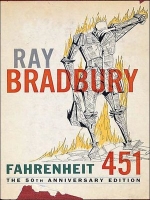I recently started using Overdrive, a digital library site that my local library participates in. I stumbled across Sense of Wonder: A Century of Science Fiction. A Princess of Mars was just the first of dozens of stories, novellas, and novels strung together with commentary on Science Fiction as a genre. I thought it would be interesting to branch out to some older stuff that I normally have not had a chance to get to.
A Princess of Mars was originally published in 1912 in All-Story Magazine under the title “Under the Moons of Mars” by Normal Bean. The story begins with the narrator explaining that he is relaying a manuscript given to him in book form. He goes over a brief biography of the main character, John Carter, known as Captain Jack Carter of Virginia — an American Civil War veteran. John finished the manuscript the shortly before his death in 1886. The manuscript begins normal enough, talking about how John and one of his friends were prospecting for gold out West. They found a good spot, and the friend was going to head back to get proper papers for staking the claim. John happens to notice three dots in the distance in the direction his friend departed, and after investigating is convinced that Apache Indians are pursuing his friend. Not much of a spoiler, but here it goes — he tries to save his friend and fails, then finds himself chased into a cave. This is where the story takes a turn toward science fiction. After a brief series of events that I won’t get into, John finds himself in some type of out of body experience then wakes up on Mars.
John Carter quickly finds himself unable to walk normally due to the lower gravity. There is a breathable atmosphere, the source of which was not explained until later on in the book. He eventually figures out the trick and it works out to his advantage with his dealings with the Martians. He is quickly regarded as a fierce warrior with the advantage of strength and the ability to leap long distances. There are several different races on Mars with a wide variety of beasts. John uses his skills in training horses to befriend his Martian guardian beast, who sticks with him with the loyalty of a dedicated dog. Very early on, the story takes a bit of a cheesy romance angle when a “Princess of Mars” (Dejah Thoris) is captured by the first group of Martians that found John. Much of the novel revolves around him trying to escape with her and return her to her people. Aparently this was a quite popular angle around the same time this book came out. I can’t say I cared much for the romance as it was a fairly shallow development. I really couldn’t see the connection develop from anything other than the fact that she looked like a human woman, and was in a helpless situation that only John Carter could save her from.
It was interesting to read something published so long ago. There were several phrases that I had to look up to find the meaning. Some of the words were so old or rare enough that they did not have matches in the Kindle dictionary. Overall, everything to make sense when taken in context with the surrounding text. At my reading speed, the book was roughly 3.5-4hrs long, so not a very long book for me. Pace started off a bit slow, since most of the time was spent explaining the Martian customs and wildlife. I wouldn’t say this was a very interesting read to start with. It took until nearly the last quarter of the book before I really go into the book and the pace picked up. The last half hour I read in one sitting, which is longer than normal as I usually only read in 15 minute increments during my lunch breaks. I was surprised by the detail of the various Martian technologies. Quite a bit of the workings were explained, much more than I expected of a book published in 1912. The action sequences were fairly detailed and exciting, so I was surprised when one of the fights that was hinted at throughout the early parts of the books was totally glossed over.
“.. drew his long-sword and advanced to meet [name]. The combat was soon over..”
I had to re-read the lines to make sure I didn’t miss something, and to make sure I didn’t skip over any pages. Conversely, there was a several paragraph account of an arena battle that didn’t really have much impact on the overall plot. Overall, I would say this book is not a waste of time as long as you’re interested in reading one of the earlier Science Fiction novels. If you’re new to the genre, I suggest sticking with something a bit more contemporary.


